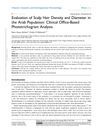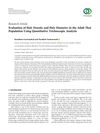 January 2018 in “International journal of food and nutrition research”
January 2018 in “International journal of food and nutrition research” Intermittent iron and nutritional supplements can help reduce hair loss.
 159 citations,
September 2001 in “European Journal of Cancer Care”
159 citations,
September 2001 in “European Journal of Cancer Care” Chemotherapy-induced hair loss significantly affects patients' well-being, and nurses are key in helping them cope, but more research is needed to find effective treatments.
 96 citations,
September 2017 in “Analytica Chimica Acta”
96 citations,
September 2017 in “Analytica Chimica Acta” Hair elemental analysis could be useful for health and exposure assessment but requires more standardization and research.
 42 citations,
July 2015 in “Cosmetics”
42 citations,
July 2015 in “Cosmetics” Nanotechnology improves hair care products by enhancing ingredient stability, targeting treatment, and reducing side effects, but more research on its toxicity is needed.
 29 citations,
March 2008 in “Postcolonial Studies”
29 citations,
March 2008 in “Postcolonial Studies” The article concludes that the global hair trade is exploitative and reflects complex cultural and economic issues.
 22 citations,
March 2020 in “Journal of The American Academy of Dermatology”
22 citations,
March 2020 in “Journal of The American Academy of Dermatology” DSC cell injections significantly improved hair density and diameter, showing potential as a hair loss treatment.
 8 citations,
November 2020 in “Infant behavior & development”
8 citations,
November 2020 in “Infant behavior & development” Collecting hair for cortisol analysis is possible in low-income mother-toddler pairs.
 8 citations,
October 2008 in “Medical hypotheses”
8 citations,
October 2008 in “Medical hypotheses” Baldness might be caused by scalp weight pressing on hair follicles.
 4 citations,
November 2020 in “Journal of Cosmetic Dermatology”
4 citations,
November 2020 in “Journal of Cosmetic Dermatology” Most Facebook posts about hair loss treatments are promotional and not medically supported, with better quality information found on YouTube.
 2 citations,
August 2019 in “International Journal of Cosmetic Science”
2 citations,
August 2019 in “International Journal of Cosmetic Science” Older age and certain lifestyles are linked to thinner, weaker hair, while how you see your hair relates to its thickness.
 1 citations,
December 2022 in “Clinical, cosmetic and investigational dermatology”
1 citations,
December 2022 in “Clinical, cosmetic and investigational dermatology” Arab hair is generally thicker but less dense compared to other ethnicities, affecting hair disorder diagnosis and treatment.
 1 citations,
August 2004 in “Alternative & complementary therapies”
1 citations,
August 2004 in “Alternative & complementary therapies” Non-drug methods like diet, supplements, and aromatherapy can help manage hair loss and its emotional impact.

A new system for classifying curly hair types using precise measurements can improve hair care products and cultural inclusion.

New methods to classify curly hair types were developed based on shape and strength.
 January 2017 in “International journal of transplantation & plastic surgery”
January 2017 in “International journal of transplantation & plastic surgery” Hair restoration techniques have improved over time, focusing on better results and less scarring, but skilled doctors are essential for natural-looking outcomes.
 January 2012 in “Elsevier eBooks”
January 2012 in “Elsevier eBooks” Hair transplantation is highly effective with careful technique and attention to patient needs.
 83 citations,
January 2015 in “World Journal of Stem Cells”
83 citations,
January 2015 in “World Journal of Stem Cells” Hair follicle regeneration needs special conditions and young cells.
 31 citations,
February 2020 in “BioMed Research International”
31 citations,
February 2020 in “BioMed Research International” Thai people's hair density decreases with age and varies by scalp area, but hair thickness stays the same regardless of age or scalp area.
 21 citations,
July 2014 in “British Journal of Dermatology”
21 citations,
July 2014 in “British Journal of Dermatology” Hair thickness matters more than density for baldness in Japanese men over 25.
 9 citations,
January 1966 in “Economic botany”
9 citations,
January 1966 in “Economic botany” Plant-based ingredients in hair care are being replaced by synthetic alternatives.
 July 2024 in “Deleted Journal”
July 2024 in “Deleted Journal” The Ayurvedic program effectively manages hair loss due to iron deficiency anemia.

Different scalp and hair disorders are more common in certain ethnic groups, with the most common being androgenetic alopecia, which is treated with medications like minoxidil and finasteride.
 81 citations,
May 2007 in “Fertility and Sterility”
81 citations,
May 2007 in “Fertility and Sterility” Testosterone therapy seems safe for postmenopausal women for a few years, but more research is needed for long-term effects.
 February 2009 in “Journal of The American Academy of Dermatology”
February 2009 in “Journal of The American Academy of Dermatology” People with early-onset hair loss have higher risk of heart issues, so early screening is important.
 14 citations,
October 2020 in “Natural Products and Bioprospecting”
14 citations,
October 2020 in “Natural Products and Bioprospecting” Various treatments, including FDA-approved drugs, natural products, and oral supplements, can help with hair loss, but a patient's medical history and potential allergies should be considered when choosing a treatment.
 January 2015 in “Springer eBooks”
January 2015 in “Springer eBooks” Chronic kidney disease can cause hair loss, which may be related to zinc deficiency or certain medications, and sometimes hair grows back when the underlying issue is treated.
 January 2015 in “Hair therapy & transplantation”
January 2015 in “Hair therapy & transplantation” New hair and scalp disease diagnosis methods are important for correct treatment.
 August 2018 in “SDÜ SAĞLIK BİLİMLERİ DERGİSİ”
August 2018 in “SDÜ SAĞLIK BİLİMLERİ DERGİSİ” No method fully prevents hair loss from chemotherapy, but some methods can reduce it and improve quality of life.
 September 2017 in “Springer eBooks”
September 2017 in “Springer eBooks” Epinephrine does not significantly affect the severity of hair loss after surgery.
 59 citations,
August 2018 in “The oncologist”
59 citations,
August 2018 in “The oncologist” Some breast cancer patients still experience hair loss three years after chemotherapy, especially with taxane-based treatments.






























